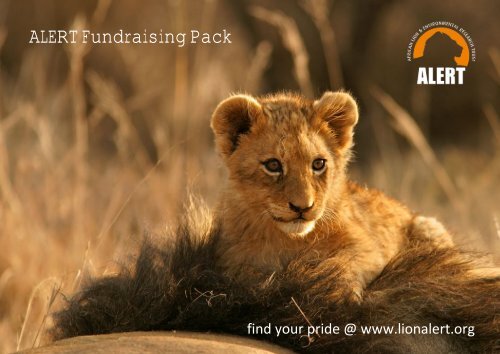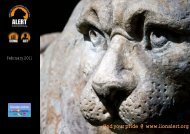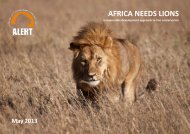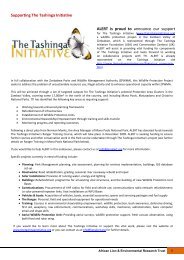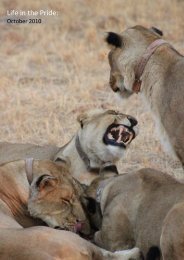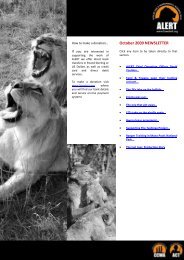ALERT Fundraising Brochure.pdf - African Lion & Environmental ...
ALERT Fundraising Brochure.pdf - African Lion & Environmental ...
ALERT Fundraising Brochure.pdf - African Lion & Environmental ...
- No tags were found...
Create successful ePaper yourself
Turn your PDF publications into a flip-book with our unique Google optimized e-Paper software.
The <strong>African</strong> <strong>Lion</strong> and <strong>Environmental</strong> Research Trust (<strong>ALERT</strong>) wouldlike to thank you for your support in organising a fundraising event in aid of our charity.As a not-for-profit organisation, <strong>ALERT</strong> relies on funding to enable us to continue to carry out our worktowards the conservation of the <strong>African</strong> lion, its natural habitat and the support of local communitieswho live alongside lions.To help you promote <strong>ALERT</strong>’s work to your potential supporters, this <strong>Fundraising</strong> Pack contains lots ofinformation about lions and what we are doing to help protect this iconic species, along with thenecessary paperwork to help you collect vital funds.The information and images used in this pack are copyright free and can be printed off to use for yourfundraising event.If I can assist you in your fundraising efforts in any way, please do not hesitate to contact me at:helen@lionalert.org<strong>African</strong> <strong>Lion</strong> & <strong>Environmental</strong> Research TrustMelrose Farm1134 Nakatindi RoadPO Box 60701LivingstoneZambia<strong>ALERT</strong> is a registered charity in the United Kingdom, Zambia, Zimbabwe and the USA.
Contentso About lionso Threats to lionso Why do we need lions?o What is <strong>ALERT</strong> is doing to help?o The <strong>African</strong> <strong>Lion</strong> Rehabilitation and Release into theWild Programo Helping Africa to help itselfo What is <strong>ALERT</strong> doing for communities?o How you can support <strong>ALERT</strong>’s worko Join <strong>ALERT</strong> in Africao You’re going to need some paperwork...o The small print – just so you’re covered
<strong>Lion</strong>: the fiercest and most magnanimousof the four footed beasts"Samuel Johnson's Dictionary of the English Language (1755)Although it is difficult to estimate <strong>African</strong> lion (Panthera leo) populationsaccurately, it is widely accepted that the species in serious decline. Since 1975,the <strong>African</strong> lion population has decreased by an estimated 80-90%. If we do nottake action now we could soon lose the King of Beasts.A recent report estimated current numbers as low as 32,000 across the whole ofthe continent. That may not sound too alarming until put into context. Only 40years ago, Africa was home to 200,000 lions. If this rate of decline is allowed tocontinue we will be facing an Africa without any wild lions in the next 40 years.The life expectancy of a male in the wild is between 10 and 12 years, but can beup to 16 years of age. Females live for between 10 and 14 years, up to an age of17. Both sexes can live up to 20 - 30 years in captivity.Male lions become sexually mature at around 26 months old, but are unlikely tobreed before the age of four or five, when they are large enough to take over apride with its associated breeding rights. Females can breed until they arearound 15 years old, but reproduction usually starts to decline at the age of 11.The Quicklinks on our website at: http://www.lionalert.org/page/panthera-leowill tell you everything you could ever want to know about lions; including theirphysical characteristics, behaviours, hunting skills and relationship to theirenvironment.
Threats to lionsThere are many causes for the continuing decline in lion numbers and the on-going threats totheir survival.Loss of habitat and natural preyAs human populations continue to expand, land which used to be available to wildlife is now being converted intovillages and turned over for agriculture. <strong>Lion</strong> populations are forced to relocate, becoming more fragmented andmaking re-colonisation more difficult. <strong>Lion</strong>s are also finding suitable food sources more scarce, as their usual preyspecies are used for human consumption.Conflict with humans and livestockRural communities and lions are now living in closer proximately than ever, resulting in inevitable incidents ofhuman/lion conflict. In retaliation for killing livestock on which communities rely, lions are being routinely shot,speared and poisoned. Despite this kind of this killing being illegal, prosecution of individuals involved is rare. Inreality, local communities are often against the conservation of lions and other species which threaten human livesand livestock, crops and agriculture.Unsustainable trophy hunting and trade in lion partsRecent studies have shown that in areas where trophy hunting is legally permitted, lion populations have severelydeclined, even in the absence of other threats. The killing of the dominant male in a pride can result in up to eightother deaths, as the surviving dominant male instinctively kills the young of its predecessor. Trophy hunting isoften perceived to be good for a country’s economy, but in reality, those most in need receive a pittance fromturning over their land to hunting operators. The trade in lion bones for the Far East traditional medicine market isalso a major threat as demand continues to increase.Disease and climate change<strong>Lion</strong> populations are fragile and vulnerable to diseases, many of which have been introduced by humans anddomestic animals. An epidemic disease, such as canine distemper virus (CDV), can wipe out large numbers of lions,but generally lasts for only a brief period. Other diseases, including Feline Immunodeficiency Virus (FIV), areendemic, meaning that they can be widespread and a constant threat. Changes in climate and to the lion’senvironment can also spread infectious diseases.InbreedingA high level of inbreeding within fragmented lion populations is a fundamental problem. It can have a negativeeffect on genetic variation, reproductive performance and can increase cub mortality, as well as leaving lions morevulnerable to disease.
Why do we need lions?The loss of lions has a negative effect on Africa’sfragile ecosystems. <strong>Lion</strong>s play an important role inthe food chain, helping to regulate numbers of themore dominant herbivore species, such as zebra andbuffalo. Without lions to control them, these speciescan out-compete other animals, causing theirextinction and reducing biodiversity.Tourism is a major boost to the <strong>African</strong> economy andlions continue to be the biggest attraction of the ‘BigFive’ for those countries which still have them. Manyof Africa’s most needy communities survive on themoney brought in by tourists and would suffer if lionswere no longer part of the safari experience forforeign visitors.And don’t forget, the <strong>African</strong> lion is an importantsymbol. It is an icon; not only to those in Africa, butall around the world. Countless companies andorganisations are proud to associate themselves withan animal that is said to be the ‘King of Beasts’.Imagine for a moment a world in which the <strong>African</strong>lion exists only in stories, pictures, statues andcompany logos.That is why we need lions.
What is <strong>ALERT</strong> doing to help?Unless the people of Africa want to conserve lions by benefitting from theirpresence, the species will continue to decline until they are all gone.The <strong>African</strong> <strong>Lion</strong> and <strong>Environmental</strong> Research Trust (<strong>ALERT</strong>) therefore workswith communities to meet the challenges of living alongside a dangerouspredator, whilst conducting research to improve our understanding of thelion’s behaviour in Africa’s ecosystems.<strong>ALERT</strong> is successfully operating pilot programs of our ‘responsible development’approach in Zimbabwe and Zambia. As a result, other countries have expressedinterest in <strong>ALERT</strong> assisting them to conserve lions, and we expect our approachto expand across the continent until we have achieved real protection of the<strong>African</strong> lion that ensures their survival.This approach requires time, cooperation and money to succeed.<strong>ALERT</strong> urgently needs your help to save the <strong>African</strong> lionIt costs less than you think to make a difference and help save the <strong>African</strong>lion. For only £3/$6 a month you can sponsor an anti-poaching scout toprotect lions and other wildlife from a painful death in a snare. For £5/$8to £10/$16 a month, you can adopt a lion and help fund its release.£125/$200 can buy a lighting system to reduce the conflict between lionsand people. £250/$400 can buy a remote sensor cameras and£3,500/$5,600 a satellite tracking collar; both help <strong>ALERT</strong> to monitor lionpopulations so more can be learnt about how to better conserve them.<strong>ALERT</strong>’s community development initiatives encourage support of lionconservation through benefit sharing. You can support a school, orphanageor healthcare facility in a needy community from only £3/$6 per month.
The <strong>African</strong> <strong>Lion</strong> Rehabilitation andRelease into the Wild ProgramThe <strong>African</strong> <strong>Lion</strong> Rehabilitation and Release into theWild Program was developed by <strong>ALERT</strong>’s partner,Antelope Park in Gweru, Zimbabwe to seek an answeras to how to successfully use captive bred lions tocreate a source for the reintroduction of lions into thewild. Aware of the risks involved in releasing lions intothe wild – a dependence on humans, the lack of asocial structure, an absence of inter-species and crossspeciescompetitive experience – the program isdesigned to overcome these challenges, offering a newway of looking at lion conservation.Today, the program has expanded to Victoria Falls, alsoin Zimbabwe and Livingstone in Zambia. There arecurrently two lion prides of captive origin alreadyreleased into semi-wild living areas through thisprogram. The Ngamo pride, released first, includes fivesecond-generation cubs with natural skills andbehaviours comparable to any wild-born lion. It isthese cubs that will eventually be reintroduced intoAfrica’s national parks and reserves. The first-bornrecently turned two years old, an age when a lion iscategorised as sub-adult; an independent member ofthe pride. She represents a new beginning for the Kingof Beasts.The program is split into the following four stages.
Stage OneBreeding Program - Males and females are separated before reaching sexual maturity to preventuncontrolled breeding. Once controlled mating has taken place and a female is ready to give birth, she ismoved to a specially designed cubbing enclosure. Here she will care for her cubs for the first three weeks oftheir life, allowing them to gain important anti-bodies from her.The cubs are then removed and are encouraged to bond with a human handler who will act as a surrogatemother. They are quick to accept the handler as the dominant member of their pride and are usuallycompletely relaxed within a couple of hours. The mother, once back with her social group, quickly adapts tothe removal of her cubs and continues to interact with her pride members as before. Removing cubs fromtheir mother is standard practice for carnivores in most zoos and captive breeding centres.<strong>Lion</strong> walks - Each set of cubs is cared for by a handler who is with them every day to provide a constantpresence from which they gain security. This gives the young cubs the confidence to follow their handlerinto the <strong>African</strong> Bush to experience their natural habitat; a vital part of their pre-release training.The cubs are taken out on their first walks around the age of six weeks old. They are easily frightened at thisage and rely on the handler for a sense of safety. Shortly after, other handlers are introduced to the cubs tosimulate a wild mother introducing her cubs to the rest of her pride, but the surrogate mother is alwayspresent to give the cubs the security they need. As the cubs get older and gain confidence, they are taken onlonger walks and are introduced to further members of the ‘pride’.The walks are designed to develop the cub’s natural hunting instincts. Through repeated exposure to preyspecies, the lions are given the opportunity to hone their natural hunting instincts. When very young, they willdo little more than watch the prey. By around the age of six-months they take tentative steps towards theanimals they encounter and even make their first real efforts at stalking. Most early attempts areunsuccessful, but by one-year old, cubs are more adept at stalking and have enough confidence to give chase.Many are making their first kills, often birds, monitor lizards or small antelope, by around 12 to 15-months old.Tourists are permitted to join lion walks when the cubs are between six and eighteen months old. They tooare seen as dominant members of the pride. In allowing this participation, the program raises awareness andgenerates funding to operate stage one of the program, as well as helping to raise finance for the later stages.
Night Encounters - At around 18-months old, the lions begin to take part in the Night Encounter program, giving them further opportunities to practice their hunting andgroup co-operative hunting techniques. Groups of up to four lions are taken on Night Encounters in a large fenced area which allows prey species the same chance toescape as an animal in the wild. A red filtered spotlight is used from a vehicle to monitor the lions' progress to reduce human impact on predator / prey interactions.While younger lions often follow the vehicle to areas where prey is known to be, as they approach two-years of age, they more commonly lead the Night Encounter;using scent trails to find prey, displaying co-operative hunting strategies more often and taking down larger game species.Stage TwoIn stage two of the program, a pride of lions is released into a small, semi-wild environment; the first step to becoming a socially stable and self-sustaining pride. Humancontact is withdrawn and the pride is responsible for hunting prey species within the release site to feed itself.<strong>ALERT</strong> currently operates two stage two release sites; one named Ngamo at Antelope Park in Zimbabwe and the other in the Dambwa Forest in Zambia. Land has beensecured for further release sites in other locations and <strong>ALERT</strong> and its operational partners are working to raise funds to proceed with their development.
The Ngamo PrideIn September 2010, a 403 acre release site became home to femalesAshanti, Phyre, Kenge, Kwali, Nala, Narnia and Athena. Within 24 hoursthey had already made two kills; a juvenile zebra and a juvenile wildebeest.Two weeks later, Milo, a seven year-old male was introduced and wasaccepted readily into the pride. There are currently five surviving cubs thatwere born and are being raised within the release site.Normally reproduction would occur in stage three of the program, as stagetwo lions are intended to be too young to breed, however this particularpride is older and was ready for reproduction. The whole pride, includingtheir cubs, will be moved to stage three when funding allows.The full story of the Ngamo pride's adventures can be found in their ownblog.The Dambwa PrideIn August 2011, a pride of six females, each around three years of age, werereleased into a 707 acre site. Less than four months later, Kela, Kwandi, Leya,Loma, Rusha and Temi were joined by a young male named lion, Zulu. Hequickly settled in well with the females and the pride has since continued tothrive, hunting successfully on a range of species including wildebeest, pukuand impala.The full story of the Dambwa pride's adventures can be found in their ownblog.
Stage ThreeIn stage three, the existing pride will be darted and moved into an area ofaround 40km 2 with a greater variety of game species. More importantly,competitive species such as hyena will also be introduced. There, the pridewill live out a near-wild existence in the managed eco-system and will givebirth to cubs that will be raised within a natural pride social system, free of anyhuman contact. As such they will gain the skills of wild-born cubs and have thehuman avoidance behaviours necessary for their successful reintroduction intothe unfenced wild of stage four.<strong>ALERT</strong> has secured land for our first stage three release area and we believethat the Ngamo pride is now ready to relocate; however a lack of capital hasdelayed development of the secured land. We will continue to seek funding toallow this release as soon as possible.Stage FourThe final stage in the program is the release of cubs born during stage threeinto suitable national parks and reserves when they are old enough. Prior torelease, each potential environment will be evaluated to establish likelysuccess. Factors such as the proximity to villages and the range of availableprey species will be considered and post-release monitoring programs will beused to evaluate the performance of the release pride and any effects on therelease environment and local communities.<strong>ALERT</strong> has already received much interest in the program from across Africa.An agreement with the first lion range state to reintroduce lions into theircountry has been signed and several others are nearing completion.
The four stages at a glance...Stage OneCubs born into the program are introduced to theirhuman ‘pride’ and develop their hunting skills duringwalks into the bush. At the age of around 18 months,they take part in night encounters in order toimprove group co-operative hunting techniques.Stage TwoA pride of lions is released into a small, semi-wildenvironment. Human contact is withdrawn and thelions are responsible for feeding themselves byhunting prey species within the release site.Stage ThreeThe pride is moved to a much larger area with agreater variety of prey, but the introduction ofcompetitive species such as hyena will make huntingmore difficult. At this stage, cubs will be raised freeof any human contact and will gain natural skills andbehaviours comparable to any wild-born lion.Stage FourWhen they are old enough, cubs born into theprogram will be released into appropriate nationalparks and reserves across Africa. Post-releasemonitoring programs will ensure that these pridesare given the best chance of a sustainable future inthe wild.
Helping Africa to help itselfThe human population of sub-Saharan Africa has grown from 229 million in 1960 to863 million in 2010, and is anticipated to reach 1.75 billion by 2050. As the world’spoorest continent, resources already in short supply are being stretched beyond theirlimit. This is especially true in rural communities, where adequate healthcare andaccess to education is lacking.<strong>ALERT</strong>, through its <strong>ALERT</strong> Communities Trust (ACT) division, is working to improvethis situation through a series of social development programs. As an <strong>African</strong>founded and based organisation, <strong>ALERT</strong> is ideally placed to be able to tackle <strong>African</strong>challenges with <strong>African</strong> solutions; solutions that are therefore relevant to the peoplewith which it works.To ensure the survival of the <strong>African</strong> lion, it is vital that <strong>ALERT</strong> has the support ofcommunities that live alongside wildlife. It is not hard to understand that a farmerwhose livestock is preyed upon by lions would not want to conserve this species. InKenya alone, an estimated 100 lions are destroyed on average every year inretaliatory killings by locals; a rate of execution that has resulted in the estimatedextinction of Kenya’s lion population by 2018. By working together to provideinnovative solutions to the problem of human and predator conflict, <strong>ALERT</strong> aims toimprove community tolerance of lions to help to two to co-exist more successfully.If local communities can benefit from <strong>ALERT</strong>’s work - and from the presence of lions -through the creation of employment, social development programs and profitsharing, they are more likely to support conservation efforts. Education is the key.Helping people to appreciate the need to safeguard their natural environment willencourage them to invest in its protection for themselves and future generations.For this reason, <strong>ALERT</strong> community projects focus on creating awareness ofconservation issues and changing perceptions in order to bring about long-termpositive changes for both people and the environment.
What is <strong>ALERT</strong> doing for communities?Numerous children in developing countries fail to reach their potential, leading to higher rates of criminality, increased reliance on the health care system and lowerfuture earnings and income potential.The resources available to schools in rural villages are extremely limited, reducing the effectiveness of the education that they can provide. <strong>ALERT</strong> offers bothmanpower and material support to these schools, enabling them to enhance their work in the local community. It upgrades and maintains buildings and facilities andsupplies teaching resources and equipment. Personnel are provided to assist teaching staff in lesson planning, producing teaching aids and giving pupils individualattention during lessons. Generous community volunteers help to pay school fees and buy uniforms for children from families unable to afford them.<strong>ALERT</strong> also offers free conservation education classes at all project sites, including at the <strong>ALERT</strong> Education Centre (AEC) in Gweru, Zimbabwe. These lessons enablecommunities to appreciate the ecological, social, economic and cultural benefits of protecting and preserving wildlife and habitats.There are also many orphanages caring for children that have lost their parents - often to AIDS - which are in desperate need of help. <strong>ALERT</strong> assists in improving thecare for these children by providing financial assistance and practical support. Often what is needed most is the time to offer children the emotional support that theyneed so much; a luxury that busy orphanage staff don’t often have.In healthcare clinics, where both resources and staff are in extremely short supply, <strong>ALERT</strong> provides personnel to assist qualified clinic staff in many of the routine tasks,freeing them up to concentrate on frontline healthcare. Again, buildings and facilities are upgraded and maintained and medication and equipment are supplied.
How you can support <strong>ALERT</strong>’s workYou can help to support wildlife, local communities and the environment through <strong>ALERT</strong>’s sponsorship programs.Adopt a <strong>Lion</strong> - By sponsoring an <strong>ALERT</strong> lion, you can help to secure and restore lion populations across Africa. There are twooptions: for GBP 5.00/EUR 6.00/AUD 7.00/USD 8.00 you can adopt a lion in stage one, which includes the adult lions at thebreeding program and cubs up to two-and-a-half years old that are undertaking daily walks and day/night encounters, or for GBP10.00/EUR 12.00/AUD 15.00/USD 16.00 you can adopt a released lion; specific lions already released into stage two of the <strong>African</strong><strong>Lion</strong> Rehabilitation and Release into the Wild program.Sponsor an Anti-poaching Scout - Wire snares set by poachers can cause terrible injury to lions and other wildlife, leading to a slowand painful death. For GBP 3.00/EUR 4.00/AUD 5.00/USD 6.00 sponsorship per month, you will enable <strong>ALERT</strong> to employ, train andequip qualified anti-poaching scouts to help protect wildlife. <strong>ALERT</strong> currently supports two anti-poaching units; Bumi Hills Anti-Poaching Unit (BHAPU) and Victoria Falls Anti-Poaching Unit (VFAPU), both of which work tirelessly to prevent all forms of poachingagainst flora and fauna and to remove snares, as well as working with local communities to stop poaching.Sponsor a School or Orphanage - <strong>ALERT</strong> supports schools around its project sites by helping to pay school fees for children unableto afford them, ensuring that buildings offer a safe and nurturing environment and through the provision of resources, such as textbooks and computers. A donation of GBP 3.00/EUR 4.00/AUD 5.00/USD 6.00 per month, will assist in the improvement of theeducation and care for these children and therefore, their future prospects.Sponsor a Clinic - <strong>ALERT</strong> is currently supporting Mkoba 4 and Mtapa clinics in Gweru, Zimbabwe. Like most frontline healthcareclinics in Africa, both are understaffed, poorly resourced and in need of building and facilities maintenance. For GBP 3.00/EUR4.00/AUD 5.00/USD 6.00 per month, you can help to improve the standard of healthcare they are able to offer to the localcommunity by ensuring that buildings are safe and that medical equipment and resources are available.Be a Friend of Victoria Falls - The Victoria Falls National Park in Zimbabwe is home to the five cascades of Mosi-oa-Tunya – thesmoke that thunders. This natural world heritage site is under attack from invasive alien plant species (IAPS), including LantanaCamara; known as the ‘wicked weed’. Native vegetation is being destroyed, threatening the local extinction of indigenous species.For GBP 3.00/EUR 4.00/AUD 5.00/USD 6.00 per hectare per month, you can help <strong>ALERT</strong> take steps towards eradicating IAPS, whileproviding local employment and enhancing tourist facilities to better educate visitors about this unique site of significant beauty.
Become a member of <strong>ALERT</strong>’s prideBeing an <strong>ALERT</strong> pride member is much more than just a name. An annual donationcontributes directly to funding range of programs from helping <strong>ALERT</strong> to provideprotection to lion populations, securing suitable release sites, a variety of researchprograms, to community development projects. By becoming a member, you are anambassador for <strong>ALERT</strong>, the lion and all of Africa’s wildlife.There are three levels of membership:<strong>Lion</strong>: (Annual) £60.00/€72.00/AU$90.00/US$96.00 <strong>Lion</strong>ess: (Annual)£40.00/€48.00/AU$60.00/US$64.00 Cub: (under 15 (Annual)£20.00/€24.00/AU$30.00/US$32.00)Further details of this and all <strong>ALERT</strong> sponsorship options can be found here.
Join <strong>ALERT</strong> in AfricaDon’t just dream about being in Africa. <strong>ALERT</strong> offers you the chance to experience thisdiverse continent for yourself, whether on a conservation program, working in thecommunity, or carrying out your own research project.VolunteeringThrough <strong>ALERT</strong>’s partnership with sister organisation <strong>African</strong> Impact, you can becomemore than a tourist by volunteering on a lion, conservation, research or communitydevelopment program. Walk with lions, or work with local people to immerse yourselfin the <strong>African</strong> environment and culture. Either way, you will be making memories tolast a lifetime.InternshipsThe <strong>ALERT</strong> Internship Program has been created to provide graduates and skilledindividuals with unrivalled opportunities to experience the complexities and challengesinvolved in working for a non-governmental organization in Africa. Whether you are agraduate looking to gain behind-the-scenes experience in conservation field work, ateacher seeking an opportunity to use your skills to help under-privileged children or avet nurse who wants a chance to work with some of Africa’s iconic wildlife, thisprogram can help you to fulfil your dreams of working in Africa. Internships areoffered in the following areas: Animal Management, Research, Project Management,<strong>Fundraising</strong> and Marketing, Teaching, Childcare and Healthcare, ConservationEducation, Hospitality and Film and Photography.Facilitated ResearchIf you are an undergraduate or graduate student working on a dissertation or thesis aspart of your degree, <strong>ALERT</strong> will assist you throughout your research process. Anexperienced team will provide logistical support to ensure data collection is carried outeffectively and will work with students off-site to complete their final written thesis.Further details of how you could join <strong>ALERT</strong> in Africa can be found here. Be warned,you will leave your heart behind when it’s time to go home!
You’re going to need some paperwork...
Africa Needs <strong>Lion</strong>s Donation FormMy name is ____________________________. I am raising funds to help the <strong>African</strong> <strong>Lion</strong> and <strong>Environmental</strong> Research Trust (<strong>ALERT</strong>) in their work towards the conservationof the <strong>African</strong> lion. Since 1975, the <strong>African</strong> lion population has decreased by an estimated 80-90%, and numbers continue to fall. If we do not take action now we could soonlose the King of Beasts.It costs less than you think to make a difference. For only £3 a month you can sponsor an anti-poaching scout to protect lions and other wildlife from a painful death in a snare.For £5 to £10 a month, you can adopt a lion and help fund its release. £125 can buy a lighting system to reduce the conflict between lions and people. £250 can buy a remote sensor cameras and £3,500 asatellite tracking collar; both help us to monitor lion populations to learn more about how to better conserve them. You can also help to support our community development initiatives that encouragesupport of lion conservation through benefit sharing. You can support a school, orphanage or healthcare facility in a needy community for only £3 per month.No matter what your circumstances, you can make a difference to the people, the environment and the wildlife of Africa. Please do it today.To all UK taxpaying sponsors: Your donation could be worth an extra 25p for every £1 - at no extra cost to you!By ticking the Gift Aid box, you are giving <strong>ALERT</strong> permission to reclaim tax on your donation. Please note: To qualify for Gift Aid, you must pay an amount of income tax or capital gains tax at least equal to thetax reclaimed by <strong>ALERT</strong> on the donation.Full nameFirst name and surnameHome addressNot your work address please (essential for Gift Aid)Postcode Amount DatePaidGiftAid<strong>ALERT</strong> wouldlike to keep intouch. We maycontact youwith moreinformationabout ouractivities. If youdo not wish toreceive thisinformation,please tickhere.TOTAL raised on this page
Full nameA First name and surnamefricanAfrica Needs <strong>Lion</strong>s Donation FormHome addressNot your work address please (essential for Gift Aid)Postcode Amount DatePaidGiftAid<strong>ALERT</strong> wouldlike to keep intouch. We maycontact youwith moreinformationabout ouractivities. If youdo not wish toreceive thisinformation,please tickhere.<strong>Lion</strong>&<strong>Environmental</strong>Research<strong>African</strong> <strong>Lion</strong> & <strong>Environmental</strong> Research Trust (<strong>ALERT</strong>), Melrose Farm, 1134 Nakatindi Road, PO Box 60701, Livingstone, Zambia.<strong>ALERT</strong> is a registered charity in the United Kingdom, Zambia, Zimbabwe and the USA. www.lionalert.orgTOTAL raised on this page
Can you imagine an Africa without lions?Since 1975, the <strong>African</strong> lion population has decreased by an estimated 80-90% and numberscontinue to fall. If we do not take action now, we could soon lose the King of Beasts.It costs less than you think to make a difference and help <strong>ALERT</strong> to save the <strong>African</strong> lion.For only £3 a month you can sponsor an anti-poaching scout to protect lions from a painfuldeath in a snare. For £5 to £10 a month, you can adopt a lion and help fund its release.£125 can buy a lighting system to reduce conflict between lions and people. £250 can buy aremote sensor cameras and £3,500 a satellite tracking collar; both help us monitor lionpopulations so that we can learn more about how to better conserve them.No matter what your circumstances, you can make a difference to the people,the environment and the wildlife of Africa. Please do it today!AFRICA NEEDS LIONS: find your pride @ www.lionalert.org<strong>African</strong> <strong>Lion</strong> & <strong>Environmental</strong> Research TrustMelrose Farm1134 Nakatindi RoadPO Box 60701LivingstoneZambia<strong>ALERT</strong> is a registered charity in the United Kingdom, Zambia, Zimbabwe and the USA.
<strong>ALERT</strong> Mini Collection BoxPrint out on A4 card and assemble to make a collection box to help raiseextra funds for <strong>ALERT</strong>.As a private collection, you are legally allowed to place these boxes on anyprivate land, such as your local supermarket, bank or pub. What you cannotdo without a licence is place the box in a public building (e.g. local counciloffice) or public place (i.e. collecting on the street). If in doubt, pleasecontact your local authority for advice.
The small print...Before organising your event, please make sure you consider any legal requirements andsafety issues. We want you to raise lots of money for <strong>ALERT</strong>, but we’d like your event tobe remembered for all the right reasons – not the wrong ones!The following information should help you to plan a successful event, but if you are inany doubt, please contact Helen Rennie, <strong>ALERT</strong> Development Coordinator, athelen@lionalert.org to discuss any concerns.Health and SafetyIt may sound obvious, but please make sure that your event doesn’t put yourself oranyone else in danger. It’s all about common sense. Just make sure you follow themanufacturer’s advice when using any equipment and if handling food; be sure to followbasic hygiene rules with regard to preparation/cooking, storage and display.If your event is potentially dangerous, you will need to take out suitable insurance coverand may even need to inform your local authority or police force if it could beparticularly unsafe.Please note: <strong>ALERT</strong> cannot accept liability for any loss, damage or injury suffered by youor anyone else as a result of taking part in a fundraising event.Data ProtectionIf your event requires you to collect information about people who have taken part,make sure you comply with the Data Protection Act. Generally, as long as you don’tkeep information about people any longer than necessary and don’t share informationor data about someone without their permission, you will be acting correctly.Raffles, Lotteries, Bingo and CompetitionsBe aware that if you are planning to hold a raffle, lottery, bingo game or competition aspart of your event, you may run into legal difficulties. There are strict laws concerningthese kinds of activities, so it is vital you are aware of any restrictions concerning yourchosen activity. The licensing department of your local authority will be able to adviseyou if in doubt.


